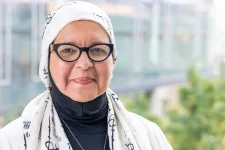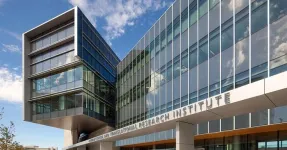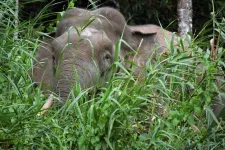(Press-News.org) A team of interdisciplinary researchers led by Arindam Banerjee, professor and chair of the Mechanical Engineering and Mechanics Department at Lehigh University, has been awarded nearly $3 million from the National Science Foundation to train a diverse group of future energy-sector leaders across academia, industry, government and policy organizations.
The five-year award will allow Lehigh to establish a SEED (Stakeholder Engaged, Equitable, Decarbonized) Energy Futures Training Program to provide graduate students with the skills needed to explore, collaborate and pioneer solutions to the society’s reliance on carbon-based energy sources and energy inequities. The program will provide training to Ph.D. candidates, as well as to those pursuing a master’s of science degree or master’s of art degree.
“We will be training graduate students to work at the intersection of energy-related problems,” said Banerjee, principal investigator. “The training would be holistic because the students would also be trained on aspects around policy—to engage stakeholders and bring in stakeholders early in their research program so that the type of solutions that they are working on is actually stakeholder-informed or stakeholder-engaged.”
Co-principal investigators are Shalinee Kishore, director of Lehigh’s Institute for Cyber Physical Infrastructure and Energy; Karen Beck Pooley, professor of practice, director of the Community Fellows Graduate Program and the Environmental Policy Design Program; and Alberto Lamadrid, associate professor of economics.
Also on the Lehigh team are Carlos Romero, director and principal research scientist of the Energy Research Center; Joan Ramage, associate professor of earth and environmental sciences and director of Lehigh’s ADVANCE center; Hyunok Choi, associate professor, Department of Community and Population Health; Breena Holland, associate professor of political science and the Environmental Initiative; and Farrah Moazeni, assistant professor of civil and environmental engineering. The project’s external evaluator is Diane Husic, founding dean of the Center for Scholarship, Research and Creative Endeavors at Moravian University.
In seeking the funding, the Lehigh team expressed a need for the energy sector to innovate and overcome two key impeding legacies—carbon reliance and energy inequities. To that end, the team said, engineers and policymakers will both need to have the skill set to drive solutions.
“Climate change is upon us,” Kishore said. “There's a major transformation in our energy systems that's needed to mitigate its effects on society and the environment. And that transformation requires us to think about new types of sustainable energy solutions and how they can be adopted across wide cross sections of society.
“In order to get to those solutions being commonplace in our energy sector, we need to have engineers who are trained to understand that these solutions need to impact society equitably. They need to be beneficial in terms of environmental and health impact to everyone. …. [They are not] just technology/engineering solutions. [They have] to be very well married and coupled with policy solutions.”
The team expects to train a cohort of 8 to 10 graduate students each year, once research projects are finalized and support staff is hired in the program’s inaugural year.
Banerjee and Kishore said it’s important for students to understand the relevance of an equitable, decarbonized energy future.
“Certain communities benefit from technological growth in the energy space, and certain communities do not,” Kishore said. And that’s true, she said for example, when locations are chosen for renewable resources or carbon capture solutions. Who will environmentally benefit?
“So when we do think about future solar farms, and we think about future solutions, we're addressing the things that didn't happen in the past, where the coal plants were put up right next to disadvantaged communities, which further suffered from the environmental and health impact of having coal facilities next to them.”
Also at issue is the lack of diversity in the energy workforce itself, Banerjee and Kishore said. The training program aims to ensure a future workforce that is diverse and reflective of society.
The training program will have seven pillars: coursework on stakeholder engagement that culminates in an annual student-led workshop; a required course on ethics and equity in technology; multidisciplinary engineering, policy, environmental science, economics, and population health graduate coursework and certificate program; participation in interdisciplinary research teams; policy focused internships; community building; and a professional development and leadership seminar series to introduce students to roles in the energy sector.
The SEED-EF faculty and the students will be partnering with a wide range of stakeholders that include City of Bethlehem (Office of Mayor), Lehigh Valley Planning Commision, The Nature Nurture Center, Pennsylvania Environmental Council, Pennsylvania Department of Environmental Protection, Philadelphia Solar Energy Association, ClearPath, NASDAQ, GTI Energy and the National Renewable Energy Laboratory.
Banerjee and Kishore stressed the importance of involving stakeholders to address energy issues and find solutions. In one local community, they said, officials dealing with an older housing stock are looking to make aging buildings more energy-efficient—improve insulation in buildings and update appliances—while officials in a neighboring city wrestle with where to locate a solar farm in order to serve a disadvantaged community.
“The students who are working on solutions can't just have one solution for everybody,” Kishore said. “It's a set of solutions that make sense for the stakeholders for whom a technique or a solution is being developed.”
The U.S. National Science Foundation announced 22 new awards on Aug. 23, 2023 through the agency's NSF Research Traineeship program, expanding NRT's reach to 45 states, the District of Columbia and the U.S. Virgin Islands. The nearly $63 million investment includes $6 million of support from the "CHIPS and Science Act of 2022."
END
Interdisciplinary Lehigh University team awarded NSF grant to train future energy leaders
The research team will provide graduate students with the skills needed to pioneer solutions toward an equitable, decarbonized energy future
2023-08-23
ELSE PRESS RELEASES FROM THIS DATE:
Carnegie Mellon University announces new Director of the Language Technologies Institute
2023-08-23
Mona Diab understands what is at stake.
As a research scientist at two of the largest technology companies on the planet, Diab saw the impact innovations had as they spread across the globe. And with artificial intelligence poised to usher in the greatest technological leap since the internet, Diab wants to train, teach and prepare students, researchers, scientists and communities to think responsibly about these new tools.
"We're living in a world of proliferating AI and generative AI. There ...
Planning algorithm enables high-performance flight
2023-08-23
A tailsitter is a fixed-wing aircraft that takes off and lands vertically (it sits on its tail on the landing pad), and then tilts horizontally for forward flight. Faster and more efficient than quadcopter drones, these versatile aircraft can fly over a large area like an airplane but also hover like a helicopter, making them well-suited for tasks like search-and-rescue or parcel delivery.
MIT researchers have developed new algorithms for trajectory planning and control of a tailsitter that take advantage of the maneuverability and versatility of this type of aircraft. Their algorithms ...
Clinical trial studying possible new treatment option for patients with NAFLD
2023-08-23
According to the National Institutes of Health, approximately 24% of adults in the United States have nonalcoholic fatty liver disease (NAFLD), an umbrella term for a range of liver conditions affecting people who drink little to no alcohol that can lead to cirrhosis, liver cancer and liver failure.
Currently, there are no medications approved by the U.S. Food and Drug Administration (FDA) to treat NAFLD.
A recent $9.57 million grant awarded to researchers with the UC San Diego NAFLD Research Center at University of California San Diego School of Medicine will support a clinical trial to study a new treatment option for patients ...
National estimates of gender-affirming surgery
2023-08-23
About The Study: In this study of 48,000 patients, gender-affirming surgery increased significantly in the U.S., nearly tripling from 2016 to 2019. Breast and chest surgery was the most common class of procedures performed overall. The number of genital surgical procedures performed increased with increasing age.
Authors: Jason D. Wright, M.D., of the Columbia University College of Physicians and Surgeons in New York, is the corresponding author.
To access the embargoed study: Visit our For The Media website at this link https://media.jamanetwork.com/
(doi:10.1001/jamanetworkopen.2023.30348)
Editor’s ...
Health claims and doses of fish oil supplements
2023-08-23
About The Study: The results of this study suggest that the majority of fish oil supplement labels make health claims, usually in the form of structure/function claims, that imply a health benefit across a variety of organ systems despite a lack of trial data showing efficacy. Significant heterogeneity exists in the daily dose of eicosapentaenoic acid + docosahexaenoic acid in available supplements, leading to potential variability in safety and efficacy between supplements.
Authors: Ann Marie Navar, M.D., ...
Study: Atmospheric circulation weakens following volcanic eruptions
2023-08-23
The Pacific Ocean covers 32% of Earth’s surface area, more than all the land combined. Unsurprisingly, its activity affects conditions around the globe.
Periodic variations in the ocean’s water temperature and winds, called the El Niño–Southern Oscillation, are a major meteorologic force. Scientists know that human activity is affecting this system, but are still determining the extent. A new study in Nature has revealed that the atmospheric component of this system — ...
How artificial intelligence gave a paralyzed woman her voice back
2023-08-23
Researchers at UC San Francisco and UC Berkeley have developed a brain-computer interface (BCI) that has enabled a woman with severe paralysis from a brainstem stroke to speak through a digital avatar.
It is the first time that either speech or facial expressions have been synthesized from brain signals. The system can also decode these signals into text at nearly 80 words per minute, a vast improvement over commercially available technology.
Edward Chang, MD, chair of neurological surgery at UCSF, who has worked on the technology, known as a brain computer interface, or BCI, for more than a decade, hopes this latest research breakthrough, appearing Aug. 23, 2023, ...
Wildlife overflow enriches biodiversity beyond park boundaries
2023-08-23
New research has discovered the power of large national parks to not only enhance bird diversity inside their borders but boost mammal diversity in nearby unprotected areas.
The University of Queensland’s Dr Matthew Luskin said the study, which involved using more than 2,000 cameras and bird surveys across Southeast Asia, reveals for the first time the benefit of expanding protected land areas around the globe beyond park boundaries.
“Protected area expansions are often a difficult and expensive process, but our results show they are absolutely worth it,” Dr Luskin said.
“We ...
Graphene: More magic starts when flatness ends
2023-08-23
Researchers from The University of Manchester and the University of Warwick finally solved the long-standing puzzle of why graphene is so much more permeable to protons than expected by theory.
A decade ago, scientists at The University of Manchester demonstrated that graphene is permeable to protons, nuclei of hydrogen atoms. The unexpected result started a debate in the community because theory predicted that it would take billions of years for a proton to permeate through graphene’s dense crystalline structure. This had led to suggestions that protons permeate not through the crystal lattice itself, ...
Researchers fully sequence the Y chromosome for the first time
2023-08-23
What was once the final frontier of the human genome — the Y chromosome — has just been mapped out in its entirety.
Led by the National Human Genome Research Institute (NHGRI), a team of researchers at the National Institute of Standards and Technology (NIST) and many other organizations used advanced sequencing technologies to read out the full DNA sequence of the Y chromosome — a region of the genome that typically drives male reproductive development. The results of a study ...
LAST 30 PRESS RELEASES:
Alkali cation effects in electrochemical carbon dioxide reduction
Test platforms for charging wireless cars now fit on a bench
$3 million NIH grant funds national study of Medicare Advantage’s benefit expansion into social supports
Amplified Sciences achieves CAP accreditation for cutting-edge diagnostic lab
Fred Hutch announces 12 recipients of the annual Harold M. Weintraub Graduate Student Award
Native forest litter helps rebuild soil life in post-mining landscapes
Mountain soils in arid regions may emit more greenhouse gas as climate shifts, new study finds
Pairing biochar with other soil amendments could unlock stronger gains in soil health
Why do we get a skip in our step when we’re happy? Thank dopamine
UC Irvine scientists uncover cellular mechanism behind muscle repair
Platform to map living brain noninvasively takes next big step
Stress-testing the Cascadia Subduction Zone reveals variability that could impact how earthquakes spread
We may be underestimating the true carbon cost of northern wildfires
Blood test predicts which bladder cancer patients may safely skip surgery
Kennesaw State's Vijay Anand honored as National Academy of Inventors Senior Member
Recovery from whaling reveals the role of age in Humpback reproduction
Can the canny tick help prevent disease like MS and cancer?
Newcomer children show lower rates of emergency department use for non‑urgent conditions, study finds
Cognitive and neuropsychiatric function in former American football players
From trash to climate tech: rubber gloves find new life as carbon capturers materials
A step towards needed treatments for hantaviruses in new molecular map
Boys are more motivated, while girls are more compassionate?
Study identifies opposing roles for IL6 and IL6R in long-term mortality
AI accurately spots medical disorder from privacy-conscious hand images
Transient Pauli blocking for broadband ultrafast optical switching
Political polarization can spur CO2 emissions, stymie climate action
Researchers develop new strategy for improving inverted perovskite solar cells
Yes! The role of YAP and CTGF as potential therapeutic targets for preventing severe liver disease
Pancreatic cancer may begin hiding from the immune system earlier than we thought
Robotic wing inspired by nature delivers leap in underwater stability
[Press-News.org] Interdisciplinary Lehigh University team awarded NSF grant to train future energy leadersThe research team will provide graduate students with the skills needed to pioneer solutions toward an equitable, decarbonized energy future





